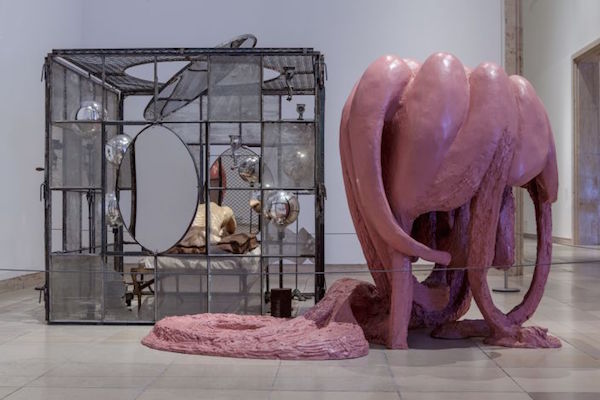
Louise Bourgeois, In and Out (1995).
Photo: Courtesy of Maximilian Geuter, The Easton Foundation/ RAO, Moscow.
On what would be the artist’s 104th birthday, we celebrate the life and work of the enigmatic Frenchwoman Louise Bourgeois. Working across sculpture, printmaking, painting, textiles, and installation, her practice was formidable: themes around her family and childhood were intensely realized through large-scale sculptural objects like Maman (1999); the body and ideas around sexuality also influenced her objects, installations, and drawings. Though she expressed that her art was not “feminist,” she made work that appeared to champion a feminine sensibility.
Born in Paris on December 25, 1911, Bourgeois grew up in period of political and cultural turmoil. After emigrating to the United States in 1938, she explored painting, and eventually sculpture. In 1982, at the age of 71, the Museum of Modern Art in New York gave the artist her first retrospective.
Imbued with emotion, and a hint of humor in places, Bourgeois’s oeuvre is as uncompromising as the artist herself. See below for a selection of quotes from the Spiderwoman herself.
Louise Bourgeois at the Académie de la Grande-Chaumiére, Paris, 1937.
Photo: Courtesy of the Louise Bourgeois Archive/Art21.
On feminism:
“My work deals with problems that are pre-gender. For example, jealousy is not male or female. I do not believe that there is a feminist aesthetic.”
Louise Bourgeois, Maman (1999).
Photo: Courtesy of Tate.
On Maman (1999):
“Like a spider, my mother was a weaver. My family was in the business of tapestry restoration, and my mother was in charge of the workshop. Like spiders, my mother was very clever. Spiders are friendly presences that eat mosquitoes. We know that mosquitoes spread diseases and are therefore unwanted. So, spiders are helpful and protective, just like my mother.”
On Robert Mapplethorpe’s 1982 portrait of her:
“They were going to say ‘everything Louise does is erotic,’ and I’m used to that. But it is in the eyes of the beholder.”
Louise Bourgeois and Andy Warhol.
Photo: via Tumblr.
On the art market:
“Even though what I do does enter the market, it doesn’t interest me. I am exclusively concerned with the formal qualities of my work…. The fact that the market was not interested in my work because I was a woman was a blessing in disguise. It allowed me to work totally undisturbed.”
On anxiety:
“Pain is the ransom of formalism.”
Louis Bourgeois, Pregnant Woman (2009).
© The Easton Foundation/Licensed by VAGA
On Surrealism:
“Surrealism is anathema for me. Because the surrealists made a joke of everything. And I consider life a tragedy.”
Louise Bourgeois, Ode à l’oubli (2002).
Image: Courtesy of MoMA/© 2013 Louise Bourgeois Trust.
On Creativity:
“To convince others, you have to convince yourself; and a conciliatory or even an unduly understanding attitude – in that it is inevitably superficial – is not helpful to creativity.”